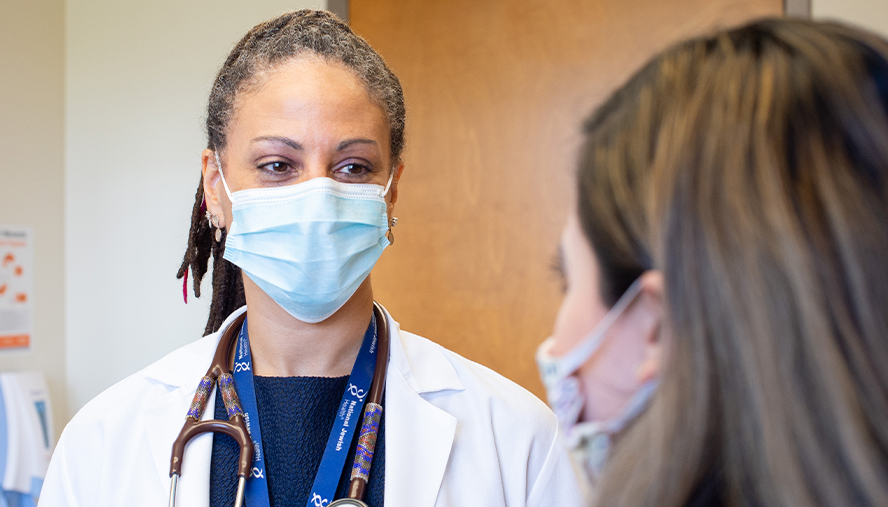Researchers to Study Pregnancy Outcomes in Women with Cystic Fibrosis
With longer life expectancy and new medications, more women with cystic fibrosis are making a previously rare choice
DENVER, CO —
Researchers at National Jewish Health, the University of Texas Southwestern Medical Center and University of Washington will lead a study seeking answers to pressing questions about cystic fibrosis and pregnancy and the use of new, highly effective cystic fibrosis medications. The $9 million study is funded by the Cystic Fibrosis Foundation.

Cystic fibrosis is a genetic disease that disrupts the fluid balance in the body, causing the buildup of thick, sticky mucus in the lungs that leads to repeated infections and life-threatening damage to the lungs. Not too long ago, children with cystic fibrosis were unlikely to live long enough to go to college. Decades of better care and treatments have dramatically extended life expectancy for people with cystic fibrosis, in turn convincing increasing numbers of women to make a once rare choice – having a child of their own. Pregnancy and childbirth for women with cystic fibrosis are still relatively uncharted territory with few studies documenting the impact of pregnancy’s metabolic strains and hormonal fluctuations on mother and child.
As a result, women with cystic fibrosis must consider many factors and uncertainties in their decisions about pregnancy. The recent development and approval of highly effective medications that are taken daily raise additional questions. Should they continue taking the medications while pregnant?
“It is incredibly exciting to hear how many young women with cystic fibrosis want to have children,” said Jennifer Taylor-Cousar, MD, co-principal investigator of the Maternal and Fetal Outcomes in the Era of Modulators (Mayflowers) study. “The Mayflowers study should provide vital information to help guide these women as they make difficult decisions about pregnancy, childbirth and motherhood.”
The past decade has seen development and approval of a new generation of medications, called CFTR modulators, that directly address the fundamental molecular flaws that cause cystic fibrosis. Most recently, a combination of three of these medications, known as Trikafta, promises to help more than 90% of cystic fibrosis patients live longer, healthier lives. Unlike most previous cystic fibrosis medications, Trikafta is taken twice daily by mouth instead of by inhalation.
Women and their physicians must weigh the risk to the baby of continuing the medication versus the risk to the mother of discontinuing it. Preclinical studies suggest the medication is safe at normal doses but clinical trials of the medication did not include any pregnant women. Some people who stop taking Trikafta suffer substantial declines in health.
Dr. Taylor-Cousar and Raksha Jain, MD, at University of Texas Southwestern Medical Center, will be co-principal investigators of the Mayflowers study, which will enroll and follow 285 pregnant women with cystic fibrosis and their babies during pregnancy and for two years after birth. They will leave the choice of continuing to take Trikafta or not to the women and their physicians. The researchers will document any changes in lung function, pregnancy and delivery related complications, infant outcomes and development in the first two years of life. Nicole Hamblett, PhD, and Amalia Magaret, PhD, at the University of Washington and the Cystic Fibrosis Therapeutics Development Network Coordinating Center will lead coordination of the 40 sites at which the study is being conducted and perform data analysis. Recruitment for the study is expected to begin in the summer of 2021.
National Jewish Health is the leading respiratory hospital in the nation delivering excellence in multispecialty care and world class research. Founded in 1899 as a nonprofit hospital, National Jewish Health today is the only facility in the world dedicated exclusively to groundbreaking medical research and treatment of children and adults with respiratory, cardiac, immune and related disorders. Patients and families come to National Jewish Health from around the world to receive cutting-edge, comprehensive, coordinated care. To learn more, visit njhealth.org or the media resources page.
Media Resources
We have many faculty members, from bench scientists to clinicians, who can speak on almost any aspect of respiratory, immune, cardiac and gastrointestinal disease as well as lung cancer and basic immunology.
Media Contacts
Our team is available to arrange interviews, discuss events and story ideas.
- Jessica Berry
303.398.1082 office
303.807.9491 mobile
berryj@njhealth.org - Adam Dormuth
303.398.1002 office
970.222.5034 mobile
dormutha@njhealth.org
